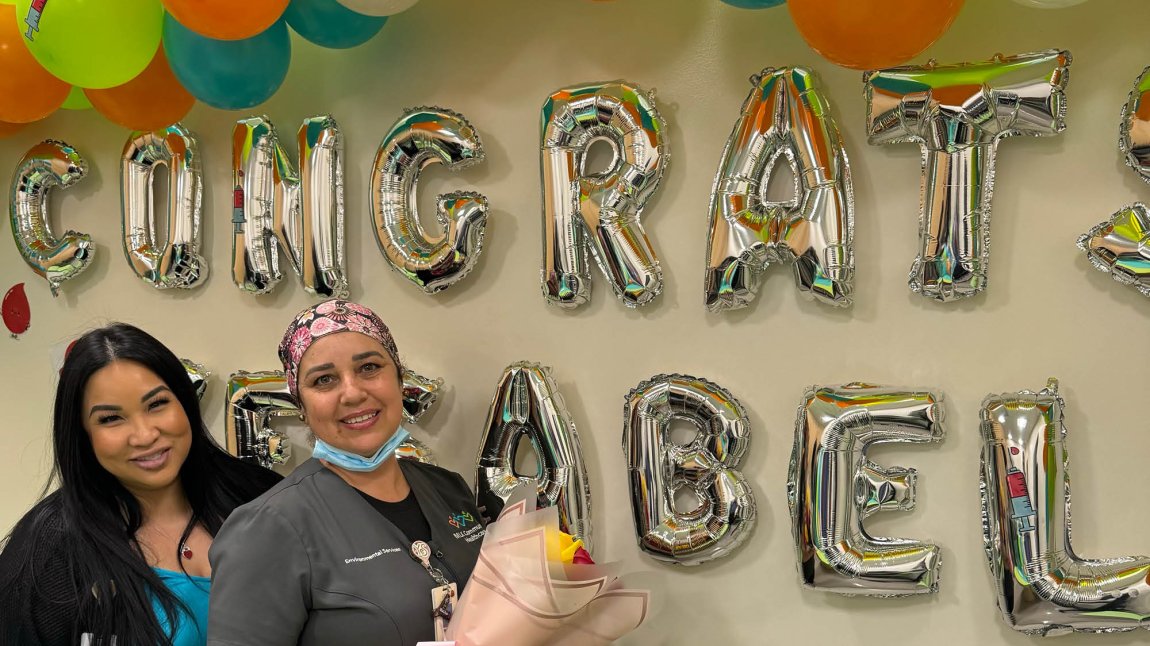Tu Puedes, Yo Puedo

Every Saturday for six months, Yesabel Sillas walked on to the MLKCH campus. But instead of heading to meet her team in Environmental Services (EVS), Yesabel found her way to a classroom, where a teacher on Zoom would lead her and coworkers through lessons on reading, writing, math, science, and social studies.
It wasn’t what she imagined when she began working at MLKCH. Yesabel had immigrated from Baja California nine years earlier. Settling in Compton with her husband and three sons, she was disappointed to learn that the university degree in sociology she’d obtained in Mexico did not transfer to American institutions. She first found work in the EVS department—cleaning, disinfecting, and housekeeping patient rooms and hospital spaces—at Torrance Memorial Hospital. Five years ago, she arrived at MLKCH, which was an easy commute in her own neighborhood. She wanted professional advancement but knew that would be impossible without an American high school degree. No previous employer had offered the opportunity to obtain one.
At MLKCH, hospital leaders knew that employees in EVS were finding it difficult to receive promotions and move up into different roles in the hospital. EVS was one of the few places an employee, many of whom are immigrants, could find opportunity without a high school degree. Many were also strong employees with the ability and desire to contribute at higher levels. It seemed like a problem with an obvious solution—one that the hospital’s Professional Development and Education department decided to tackle.
Rachel Villanueva is MLKCH’s education specialist for ancillary services, the departments comprised of all non-clinical staff who make a health system’s daily operations possible—public safety, transport, parking, EVS, among others. She helped to create a High School Equivalency Test (HiSET) program that would arrange preparatory classes for employees. Though HiSET prep classes can be found for free, the MLKCH program would cover the cost of exams and books, which can add up to hundreds of dollars. It would also ensure department leaders’ support, giving student employees time away from work to attend classes. Rachel also made sure students had consistent access to computers by securing classroom space in MLKCH’s Medical Office Building.
During department huddles, Rachel began promoting the new program to EVS employees. Two cohorts formed, with six in Spanish-language classes, and three in English-language classes.
Though it had been 27 years since Yesabel had last been a student, she found herself falling into the rhythms of school again. She had the support of her family, who encouraged her for trying something new, her co-workers, and Rachel, who became both cheerleader and liaison between the students and their teachers.
When it came time to take her subject exams, “I had to take math three times,” Yesabel says, laughing. “Everything else was ok though!”
That wasn’t the end of the story. For Yesabel, it was a new beginning. With her degree in hand and MLKCH’s continuing education stipend, Yesabel signed up for a six-week phlebotomy course, learning to draw blood samples from patients. The work is often a stepping stone to further healthcare careers. Elbert Tianco, MLKCH’s lab manager, gave Yesabel the opportunity to complete her required two-week externship in MLKCH’s lab.
Now, a little over a year since she first began taking her HiSET prep classes, Yesabel is a full-time phlebotomist in that same MLKCH lab. Her coworkers are proud of her. Her sons have a mom who achieved aspirations that seemed unreachable when she first came to this country.
“Ancillary staff are the backbone of the hospital,” says Rachel. “But most health systems don’t offer them training and development opportunities like this one.”
The HiSET program has been just one more way in which MLKCH has moved beyond the typical role of a hospital system—finding innovative ways to provide opportunities for hourly-wage employees. It matters that many of them live in South LA. It’s part of the MLKCH mission of investing in the community.
Yesabel had never considered a career in healthcare. Since working at MLKCH though, she’s found doors opening. “I like working with blood,” she says seriously, before cracking a smile—and getting to the heart of things. “I like having contact with the patients.”
Yesabel’s success is inspiring her coworkers to keep working towards their own high school degrees. “Everyone taking the classes supported each other,” Yesabel says. “They say to me, ‘Tu puedes, yo puedo.’” You can do it, I can do it too.